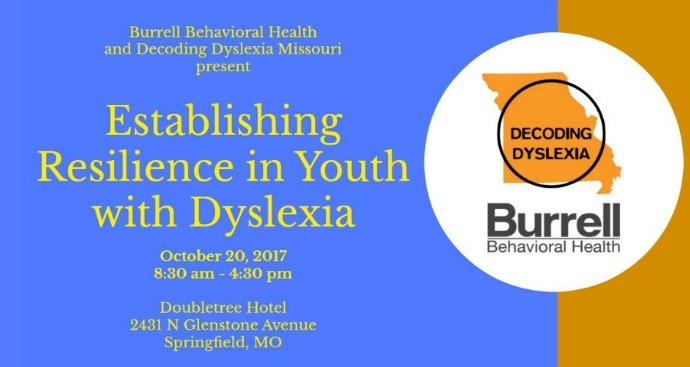Join us Friday, October 20, 2017, for a conference entitled “Establishing Resilience in Youth with Dyslexia” presented by Decoding Dyslexia Missouri in conjunction with Burrell Behavioral Health in Springfield, MO. This daylong event of expert advice will address the identification and treatment of dyslexia where we explore not only how to strengthen early identification, treatment, and resources; but also how to focus on building strengths and resilience.
Our national experts will provide information designed to guide the assessment of dyslexia and reading disorders, explore technology supports, as well as provide expert advice on building resilience in youth struggling with dyslexia. Parents of Dyslexic students will benefit from the information and strategies discussed, as the conference will provide an enhanced understanding of current trends and advocacy for their children.
Registration is $39 for teachers and professionals, $29 for Students or Parents of a dyslexic child. Seating is limited, so register early here to attend. Traveling from out of town? We have special room rates for the conference. Please see details on the registration page.
Featured Presentations
Dyslexia: An Overview, Interventions, and Building Resilience

Kelli Sandman-Hurley, EdD
Dr. Sandman-Hurley, author of “The Dyslexia Advocate” and co-founder of The Dyslexia Training Institute, will be providing an overview of what dyslexia is, and what it is not. Dyslexia is not a gift. It just isn’t. Students with dyslexia are not going to be successful, creative geniuses because they are dyslexic. They are going to be successful, creative geniuses because they are resilient, have support from community and family, are smart, and like the rest of us found something they love. The books written about those who are uber successful have super-supportive families or someone in their life who took an interest. You may be that person. Throughout the day Dr. Sandman-Hurley will describe what dyslexia is – from symptoms to challenges, to interventions, and finally to building the characteristics that lead to resilience. She will also provide an introduction to teaching the structure of the English language.
Technology for Students with Dyslexia

John Effinger, MS, CCC-SLP
This session will discuss technology accommodations for students with Dyslexia in the classroom. Alternative text access for reading and writing will be discussed including alternative educational materials (AEM) for students not on an IEP. In addition, we will discuss computers and tablets that can be used with software and apps to increase access to text and increase written production.
Self Advocacy for the Dyslexic Student

A. Noel Leif, CALT/ICALP
This session will discuss the importance of teaching and encouraging children to have the ability to self-advocate in the classroom setting. Children need to know how to tell their story effectively and communicate their strengths as well as their challenges and how to ask for what they need to succeed from educators.






